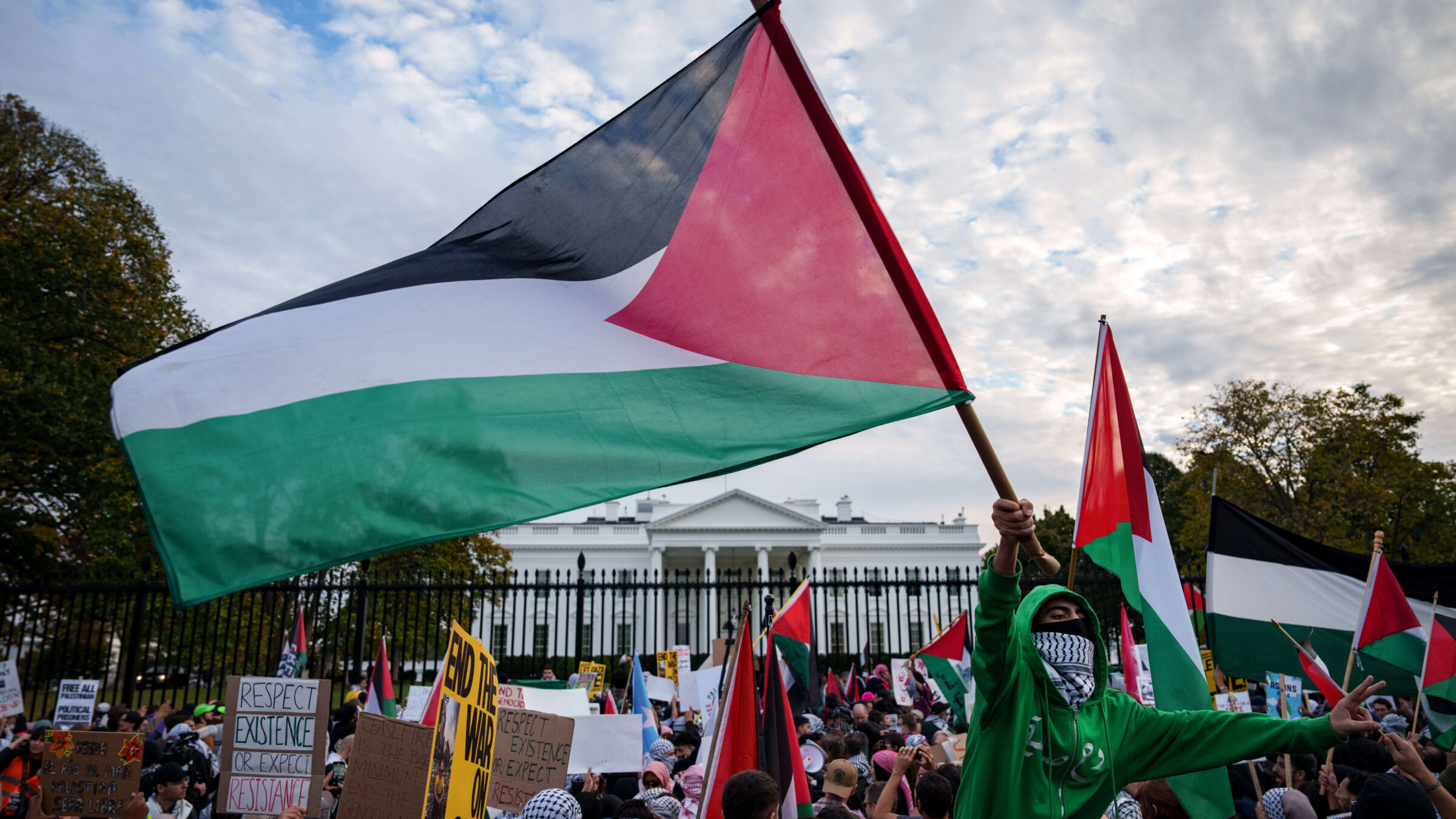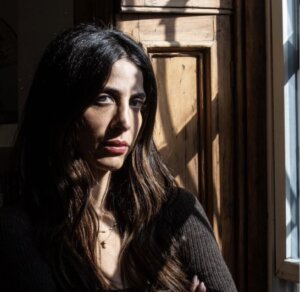I want Palestinians to be free. But hearing the Capital Jewish Museum shooter’s chant terrifies me
For the sake of my Palestinian friends, I am trying to teach my body to react differently when I hear ‘Free Palestine’

Demonstrators fly Palestinian flags outside the White House during the National March on Washington for Palestine, Nov. 4, 2023. Photo by Drew Angerer/Getty Images
When I first saw headlines about the cold-blooded murder of two Israeli Embassy workers in Washington, D.C, I knew this horrific act of domestic terrorism was enacted in the name of Palestine. As I watched the suspect confirm my intuition, chanting loudly in the drum-beat cadence I’ve come to know well — “Free, Free Palestine!” — I recoiled in disgust.
Yes, disgust.
Despite my sincere belief that this slogan in and of itself is not a threatening one, the sound of this particular chant elicits an almost Pavlovian response in my body that screams “Danger!” The connection between this chant and my body has been made and reinforced too many times to count for my mind to override it.
After Hamas’ Oct. 7 attack on Israel, I was thrust into advocacy for my six family members who were taken hostage; my cousin David Cunio is still in captivity. The past 19 months have been a challenging exercise in emotionally regulating my direct trauma in order to help me advocate for my family and an end to the war.
While there is an important need for that discourse, I fear the Jewish community is giving too much of ourselves over to intellectual debate. Instead of avoiding naming our own feelings, we need to make space to express the emotional and somatic weight that is buried inside so many of us.
Early on in my advocacy, I quickly noticed how strong my own visceral responses were to the pro-Palestinian political rhetoric that endlessly surrounded me. I felt sick when I saw it scribbled over the posters with faces of my 3-year-old twin cousins who were held hostage. I was filled with rage hearing it from the loud protest chants that mobilized within days of the Oct. 7 terrorist attack and my family’s kidnapping. It terrified me when someone breezily told my brother that our 5-year-old cousin, Emilia, looked like a white colonizer and deserved to be kidnapped.
Every word felt like an attack on the people I love, my culture and everything that I am. I did my best to tune almost all of it out.
Eventually, after some of my family members were released at the end of November 2023, I had more space to explore these big feelings of mine, and how my body responds to pro-Palestinian activism. I decided I needed to get curious if I ever wanted to take back some control over my nervous system and pursue the type of peace work I am committed to doing with Palestinians.
This type of somatic exploration is something I had been doing in therapy long before now, and I turned it toward understanding my reaction to pro-Palestinian slogans and symbols. I began practicing noticing the feeling and naming how it was showing up in my body. For example, a Palestinian flag brought up rejection and a punch in the gut. Hearing “Glory to the martyrs” made me feel wounded, accompanied by a hardening of the muscles in my jaw and a strain on my chest. “Resistance by any means necessary” set off maximum fear, and caused my heart to beat at a rapid pace.
This somatic work really became transformative when I used it to focus my attention more on Palestinians themselves and our shared pain, rather than the protesters in the West who claim to speak in their name. I began to draw mental connections between my own feelings in response to pro-Palestinian slogans, and those of Palestinians in relation to our symbols and words.
I understood how for me, seeing an Israeli flag feels like home. To them, it may also feel like that punch in the gut. “Am Israel chai” is my rallying cry of freedom; to them, it feels oppressive. These realizations actually freed me from some of the triggered feelings I had been having, and allowed me to make meaningful relationships with a growing list of Palestinian peace activists, who have become some of my most precious allies and a source of hope.
I was recently messaging with a Palestinian friend from East Jerusalem, who asked me to help her understand antisemitic instances of the use of “Free Palestine.” She wondered what I think about the way many people respond harshly to the Star of David because of its use on the Israeli flag, which some think is a conflation of Judaism with the modern state of Israel. I told her I understood why the symbol would cause distress for her and other Palestinians, but not for those in the West, who don’t have the same lived experience of violence under its banner.
I reminded her that when she wears her kaffiyeh, I feel immensely proud of her and how she defines its meaning as a symbol of her people, but I cannot feel the same about the woman sporting it as a fashion accessory in my local Brooklyn coffee shop. She understood and agreed with me, and through this exchange, we had another opportunity to cultivate the mutual respect that allows us to reject the polarizing forces that pit us against each other.
To be a human being is to be a feeling being and we should not deny ourselves of this. While there are people within the pro-Palestinian movement who are not hateful of Jews, there is a great deal of ignorance, violent rhetoric and, yes, antisemitic behavior that has now resulted in the murder of two people coming out of a Jewish museum in our nation’s capital. I know the feelings in my body are not lying to me all the time.
For the sake of my Palestinian friends and for the peace work I am committed to doing, I have tried to teach my body to react differently to the sound of the chant shouted by the gunman, but the truth is that I don’t think I can ever successfully do it. Certainly not right now, and maybe not ever.
Nonetheless, I know that the regulation of my nervous system is only part of the goal. When I am able to listen without experiencing intense panic, progress is made and that is what empowers me. Even if I still feel that punch in my gut when I hear a protester shout “Free Palestine,” I will keep investing in my relationships with Palestinians, so as to let that feeling be a feeling, and not always an existential threat.

















